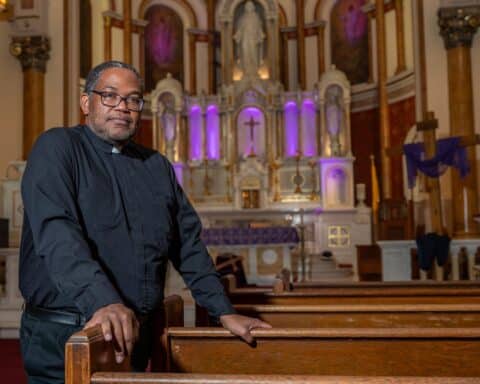Dear Friend,
The good thing about not caring about something is you don’t care when it’s gone. Actually, that’s not a good thing at all. Maybe it’s convenient and easier not to care, but we are created to care about things and especially about people. The risk of pain in losing who and what we care about is the cost of being the kind of people we are supposed to be: people who care.
We all want to be happy; in fact, we are created for and called to unending happiness, but not at the expense of avoiding suffering. Part of our growth and development toward becoming fully human is found in learning how to suffer well, which includes learning how to grieve. Grief is the natural, human response to losing something or someone we love. Without love, there is no grief.
You may already know exactly what I’m talking about because you have experienced the kind of suffering for which there is no “afterwards” when things go back to “normal.” Whether you have or have not suffered in this deep and life-altering way, I think we share a common duty: to prepare to become the kind of people who learn how to bear with loss rather than avoid loss. That sounds unappealing, like a total downer of an idea, yet the truth is that we are created for more than we often expect or desire for ourselves. We are created for the great joy and privilege of loving, and for being the kind of people who can and will bear the cost of love.
As I have tried to do with each of my letters to you, I want to both draw from my experience and, even more, from what I have learned to try to tell you the truth about grief. I have four things to share with you about how to grieve.
Grieve slowly
So much of our modern lifestyle is about staying on schedule. We hate getting behind — we fear being behind — and yet we are constantly behind. We live in environments where progress is everything, where speed and efficiency are revered. We are even encouraged to treat losses in this manner: deal with them quickly and move on. Don’t get bogged down, don’t dwell on things, don’t stop moving.
Grief protests against the tyranny of progress. Rushing means not taking things or people seriously, and grief emerges from the recognition that what or who you have lost does indeed matter. If they didn’t matter, you wouldn’t feel sorrow. Letting the pain of grief rest with you is how you honor what or who you have lost.
Practically speaking, grieving slowly requires changes to what and how you live on a day-to-day basis. During a period of grieving, you should intentionally declutter your schedule, you should not submerged yourself under one distraction after another, and you might develop some new practices for how to give yourself the time and space to honor your grief: journaling, periods of silence throughout the day, a retreat, creating art, talking with a confidant or mentor.
Nothing is sadder than a life where nothing matters. Give yourself time to grieve, because the people and experiences in your life do, in fact, matter.
Grieve deeply
Clichés are for the shallows. “Everything happens for a reason” distorts the truth and promises an easy-out for the hard things. For those of us who believe in God and entrust him with our lives, it is true that God abides with us in all things and that he will carry all things to a good end in him if we will but let him. But that doesn’t mean there is a reason for violence, or betrayal, or cancer, or death. God does not respond to such things with an explanation — “here’s why this happened, here’s the reason” — instead, God answers with action: God moves near to us in our sorrow and shares in it. The Incarnation is nothing if not that. “Everything happens for a reason” is a distortion of that exceedingly more profound and marvelous truth.
One non-clichéd saying that has stuck with me over the years is from Léon Bloy, who said that “there are places in the heart that do not yet exist, and into them enters suffering, that they might exist.” That’s a hard thing to grasp. I think you only grasp it by allowing suffering to enter your heart. Only then do we discover how the suffering and grief that we take to heart strangely, almost miraculously, makes our hearts grow larger. We become more rather than less capable of compassion, and therefore of love.
Grieve openly
I mean this in two senses. The first sense is this: Do not grieve in shame or in secret. It is a distinctly (and unhealthy) modern thing that those who grieve are more or less expected to grieve in private. This is nonsense, and it is completely inhumane. Share your grief with friends, co-workers, neighbors, each in a way appropriate to your relationship with them.
The second sense of grieving openly is about doing something with your grief. Open your grief up. I learned about this from St. Augustine. Earlier in his life, he had a friend that was very dear to him. Then this friend died unexpectedly. Augustine says that then “black grief closed over my heart.” What he means is that his whole world locked up around him. All he did was spend his time seeing and thinking about how his friend was not there and how his own life was now only marked by this loss. He didn’t do anything with his grief; he just sat in it and let it consume him.
Now, that sounds strange coming after what I was just writing about in terms of grieving deeply. It seems like Augustine grieved very deeply, and indeed he did. But grieving deeply does not mean you cannot or should not grieve openly. Augustine shows us this later in his life, when his mother, Monica, died. The difference by this point in his life — after he had become a Christian, by the way — is that he risked doing something with his grief. First, he prayed about it, offering his pain to God, asking for God’s healing. Second, he prayed for his mother, begging God to forgive her whatever sins she had and to take her into his love. Third and finally, he did what his mother asked him to do before she died: He remembered her at the altar — that is, he offered his pain and prayers for her with Jesus’ offer in the Eucharist. He did not suddenly feel all better. He continued grieving, but he did something with his grief. He opened it to God and, as a matter of fact, opened it to others in writing about it. His grief was both deep and open.
Grieve communally
Just like there are two sides to grieving openly, there are two sides of grieving communally. First, be open to sharing your grief with others. In doing so, you are doing them a favor: You are giving them the opportunity to become more fully human, to be compassionate, to be who and how they are created to be.
The other side of grieving communally is about when other people grieve, rather than you. When it comes to other people, you cannot determine whether or not someone else will be afflicted by grief. What you can always decide, though, is whether or not another person grieves alone. Do not let others grieve alone. You can choose to pay the cost of loving them. You can bear what is not yours as if it were yours. You can spend time with them, weep with them, listen to them, console them, pray with and for them, offer small sacrifices for them, and offer big sacrifices for them. You can let their pain affect you. This is not the easy path: It hurts. But it is a pain you choose out of love. It is part of the cost of being fully human. It is a serious but glorious price to pay.
Sincerely,
Leonard J. DeLorenzo, Ph.D., works in the McGrath Institute for Church Life and teaches theology at the University of Notre Dame. His forthcoming book is “Our Faithful Departed: Where They Are and Why It Matters” (Ave Maria Press, $13.95). Subscribe to his weekly newsletter, “Life, Sweetness, Hope,” at bit.ly/lifesweetnesshope.






